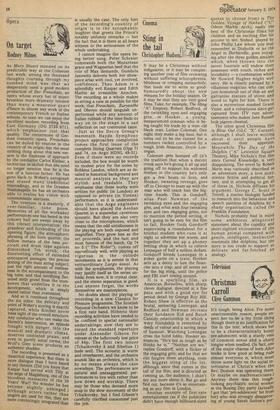Opera
On target
Rodney Alms
As Mary Stuart mimsied on its predictable way at the Coliseum last week, among the thousand thoughts coursing through my numbed mind was that we desperately need a good modern production of Der Freischatz, an opera whose every bar of music breathes more dramatic tension than many a mauvaise quart d'heure in almost any work of the contemporary French or Italian schools. At least we can enjoy the excellent modern recording from East Germany (DG 2720 071), which emphasises just that quality. The cornerstone of German romantic opera, Freischutz can be dulled by routine in the country of its origin, but the most striking thing about this new version is the freshness of approach by the conductor Carlos Kleiber, a technician so skilled that one need no longer mention that he is the son of a famous father. He has gone back to Weber's autograph and erased many traditional misreadings, and in the Dresden Staatskapelle he has an orchestra able to realise his vision with commendable alertness.
The overture is a masterly, if over-familiar, tone poem. Memories of all the workaday performances one has heard in the concert hall are swept away by this vibrant interpretation: the grandeur and foreboding of the opening figure; the atmospheric phrasing of the horn quartet; the hollow menace of the bass pizzicati and drum taps against diminished 7th scrub; the disorienting effect of extended syncopated passages; the precise dotting of the main string subject; just the right amount of restlessness in the accompaniment to the big tune; and that terrifying flattened sixth growl from the trombones that underlies it in the development, which is simply stated rather than overstated.
And so it continues throughout the six sides: the delicacy and point of Weber's scoring is exactly captured, while Kleiber never loses sight of the overall structure. Any conductor who can make the Hermit's intervention, an episode fraught with danger, into the musical and dramatic climax, deserves unstinted praise, and even in purely aural terms, the Wolf's Glen scene produces an authentic shudder.
The recording is presented as a theatrical experience. But there is more dialogue than I have heard in any theatre. (Did you know that Kaspar had served with Tilly at the seige of Magdeburg, one of the bloodiest massacres of the 30 Years' War? No wonder he has become slightly unhinged.) Although actors rather than singers are used for this, they are more convincingly integrated than
is usually the case. The only hint of the recording's country of origin is in the sycophantic laughter that greets the Prince's notably unfunny remarks — but the fact that it is there at all bears witness to the seriousness of the whole undertaking.
I cannot imagine the opera being better sung. Peter Schreier, commands both the Mozartean grace and Wagnerian beef that the role of Max demands, Gundula Janowitz delivers both her showpiece arias with cool, yet involved, confidence, Theo Adam is a splendidly evil Kaspar and Edith Mathis an irresistible Annchen. The recording as a whole makes as strong a case as possible for the work; that Freischatz, Euryanthe and Oberon should languish unperformed while any amount of Italian rubbish of the time finds its way on to the stage is a sad reflection on our communal taste.
Just as the Decca Group's mammoth Haydn Symphony project approaches completion comes the first issue of the complete String Quartets (Opp 71 and 74, on Argo HDNL 49-51). Even if there were no records included, the box would be worth its modest price for the notes by Robbins Landon, which are as detailed in historical background and musical analysis as they are stylish and readable. They emphasise that these works were written for public (in London) as opposed to private (in Vienna) performance, so it is understandable that the Argo engineers should have placed the Aeolian Quartet in a somewhat cavernous acoustic. But they are also very close to the microphones, which means that the odd untidinesses in the playing are both exposed and magnified. They grow less as the set proceeds, and the last and most famous of the batch, Op 74 no 3 (" The Rider"), comes off marvellously well, with playing as vigorous in the outside movements as it is serene in that extraordinary Largo assat. As with the symphonies, the playing may justify itself as the series unfolds; even now, it is crystal clear, and the stereo separation is good. Lest anyone forget, the works themselves are masterpieces.
No doubts about the playing or recording in a new Classics for Pleasure programme. The Scottish National Orchestra we know to be a first rate band. Hitherto their recording activities have tended to be confined to special nationalist undertakings; now they are to record the standard repertoire under Alexander Gibson for release at the ludicrously low price of 84p. The first two issues (Tchaikovsky 5 and Sibelius 1) bode well. The acoustic is warm and reverberent, and the orchestra sounds like an orchestra, which is by no means always the case nowadays. The performances are natural and unexaggerated: performances to live with rather than bow down and worship. There may be those who demand more soup in the slow movement of the Tchaikovsky, but I find Gibson's carefully clarified consomme just the job.


























 Previous page
Previous page